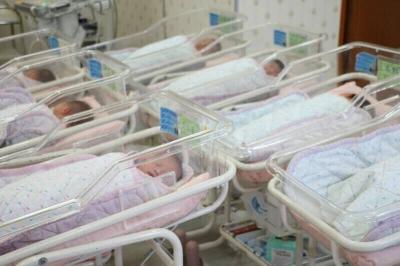Orders for online mask purchases can be placed starting tomorrow, the Central Epidemic Command Center (CECC) said yesterday, one day after it announced it was testing an online system for buying masks.
People would be able to order their weekly ration of masks online and pick up their purchase at convenience stores, in addition to the options of buying them at National Health Insurance (NHI)-contracted pharmacies or public health centers, said Minister of Health and Welfare Chen Shih-chung (陳時中), who is also head of the center.
People would need their NHI card or Citizen Digital Certificate to log on to the system, or use the National Health Insurance Administration’s mobile app (全民健保行動快易通) to order masks, Chen said, without specifying the Web site that is to be used for the orders.

Photo: Wang Yi-sung, Taipei Times
The first round of orders, from tomorrow to Wednesday next week, would serve as a trial run for the program, he said.
People who place an order during that period would be sent a confirmation text message to their cellphone with payment instructions, and once they have paid through automatic teller machines (ATM), Internet banking or credit cards online, they would be able to pick up their orders between March 26 and April 1, he said.
Each mask costs NT$5 and a handling fee of NT$7 would be charged per order, he said.
“People do not have to worry about having to ‘snap up’ masks as if they are buying tickets,” Chen said.
People would need to present their confirmation text message, along with either their NHI card, national identification card or driver’s license, to pick up their masks, the CECC said.
Vice Minister of Economic Affairs Wang Mei-hua (王美花) said if the number of orders in the first round exceeds the number of masks allocated for the online sales, a lottery would be held to determine who would get the masks.
The Executive Yuan launched a rationing policy on Feb. 6, restricting Taiwanese and foreign residents to buying masks at NHI-contracted pharmacies or public health centers with their NHI cards or Alien Resident Certificates, with a weekly ration of three masks for adults and five masks for children.
The CECC found that many younger people with daytime jobs were unable to buy masks because they were not able to take the time to line up at pharmacies, so they decided to expand the purchase methods, Wang said.
However, the number of masks sold at pharmacies would remain the same, he said.
Packaging of masks would be done at distribution centers prior to shipping to the four major convenience store brand outlets, he added.
The real-name mask purchasing system would be reviewed weekly and modified if necessary to meet the public’s needs, Wang said.
In other developments, Deputy Minister of the Interior Chen Tsung-yen (陳宗彥) yesterday said that starting today, people placed under mandatory home quarantine upon arrival at the nation’s airports would be fined if they take public transportation to reach their homes or if they travel by a method other than what they had told authorities.
The move came after the CECC on Wednesday last week launched an airport-to-home transport service for people subject to mandatory home quarantine.
Those who take public transportation could be fined between NT$100,000 and NT$1 million (US$3,329 and US$33,293), and between NT$10,000 and NT$150,000 if they return home by a method other than the one they reported, Chen Tsung-yen said.
The transport service was used by 24 percent of those placed under home quarantine the first day it was offered, and by Monday the number had increased to 39 percent, he said.

An apartment building in New Taipei City’s Sanchong District (三重) collapsed last night after a nearby construction project earlier in the day allegedly caused it to tilt. Shortly after work began at 9am on an ongoing excavation of a construction site on Liuzhang Street (六張街), two neighboring apartment buildings tilted and cracked, leading to exterior tiles peeling off, city officials said. The fire department then dispatched personnel to help evacuate 22 residents from nine households. After the incident, the city government first filled the building at No. 190, which appeared to be more badly affected, with water to stabilize the

Taiwan plans to cull as many as 120,000 invasive green iguanas this year to curb the species’ impact on local farmers, the Ministry of Agriculture said. Chiu Kuo-hao (邱國皓), a section chief in the ministry’s Forestry and Nature Conservation Agency, on Sunday said that green iguanas have been recorded across southern Taiwan and as far north as Taichung. Although there is no reliable data on the species’ total population in the country, it has been estimated to be about 200,000, he said. Chiu said about 70,000 iguanas were culled last year, including about 45,000 in Pingtung County, 12,000 in Tainan, 9,900 in

DEEPER REVIEW: After receiving 19 hospital reports of suspected food poisoning, the Taipei Department of Health applied for an epidemiological investigation A buffet restaurant in Taipei’s Xinyi District (信義) is to be fined NT$3 million (US$91,233) after it remained opened despite an order to suspend operations following reports that 32 people had been treated for suspected food poisoning, the Taipei Department of Health said yesterday. The health department said it on Tuesday received reports from hospitals of people who had suspected food poisoning symptoms, including nausea, vomiting, stomach pain and diarrhea, after they ate at an INPARADISE (饗饗) branch in Breeze Xinyi on Sunday and Monday. As more than six people who ate at the restaurant sought medical treatment, the department ordered the

Taiwan’s population last year shrank further and births continued to decline to a yearly low, the Ministry of the Interior announced today. The ministry published the 2024 population demographics statistics, highlighting record lows in births and bringing attention to Taiwan’s aging population. The nation’s population last year stood at 23,400,220, a decrease of 20,222 individuals compared to 2023. Last year, there were 134,856 births, representing a crude birth rate of 5.76 per 1,000 people, a slight decline from 2023’s 135,571 births and 5.81 crude birth rate. This decrease of 715 births resulted in a new record low per the ministry’s data. Since 2016, which saw